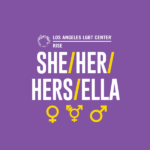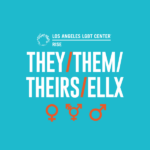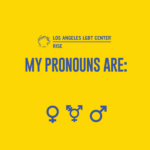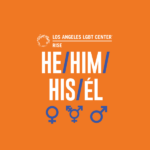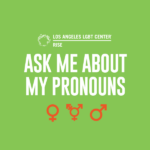Many of us don’t realize the privilege we experience being able to navigate the world without being misgendered on a regular basis. In the same way that we can (and should) be asking folks how they would like us as LGBTQ people to show solidarity, we can also be taking proactive steps to shift a culture of assumptions based on how we perceive gender.
Asking for and asserting pronouns in various spaces is one of the many ways we can accomplish it. Some of the easiest ways to incorporate this change in action is by including pronouns in our email signatures, introducing pronouns along with one’s name, and sticking to someone’s name or neutral pronouns if they have not shared theirs with us.
Share your pronouns now on social media: (Click on the photo to open and then right click to download.)
The Los Angeles LGBT Center’s RISE (Recognize Intervene Support Empower) program serves LGBTQ+ youth who are in foster care along with training and coaching professionals who work in the child welfare system. As a part of that process, two of the most common themes we address are allyship and understanding the coming out process.
Just last week, on October 11, we celebrated National Coming Out Day. But for so many in our community, especially youth in systems of care, coming out may not only be a lifelong process but a daily one. Each time you get a new social worker, a new foster parent, etc. might mean you have to come out all over again. On top of that, there are the small yet significant moments throughout any given day—buying groceries, a substitute teacher reading the class roster—where one may have to weigh the risks of asserting their pronouns. It’s in all of the spaces we embody as adult allies to LGBTQ+ youth where we can model actions that support and affirm all identities.
Still, I know that a lot of folks are newer to understanding pronouns and the importance of reflecting them. There are languages that don’t even have gender pronouns, so cultural context is also important. If those scenarios apply to you, ask yourself, “Is it more important that I ‘get’ it before doing it, or is it more important that I extend compassion and respect to someone who has asked me to use particular pronouns?”
I hope it’s the latter, and I hope you’ll join us on a journey of continuing to learn about support. We may hit bumps in the road, but if you extend patience to yourself and others, as well as a willingness to be educated, you’ll be off to a good start. If we are to lead the revolution by example, it is our duty to push back against the norms that exist which erase the existence of our big, beautiful, and diverse community.
By Ariel Bustamante
RISE Training and Coaching Manager
Los Angeles LGBT Center



